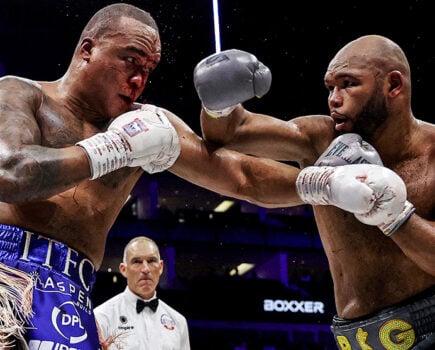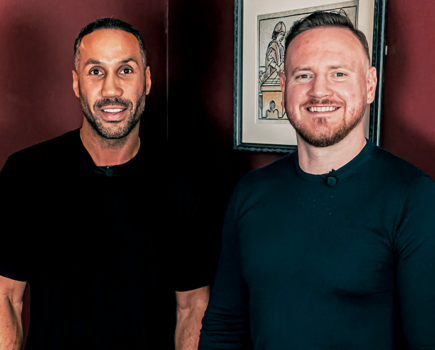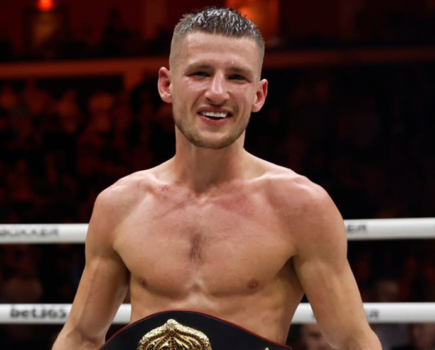BN: What is your opinion of Edgar Berlanga?
PM: I think he’s very good. He obviously beat Jason Quigley who I thought gave him a few problems. Quigley was a great amateur and is a good boxer so to be able to do that to Quigley shows that he’s good. I think Berlanga’s a good fighter. He seems to have slowed down a bit because in his first 16 fights he had first-round knockouts. I think that’s affected him negatively because he’s not knocking people out now. He’s a good fighter, he’s strong, he’s aggressive and I’m under no illusion of what I’m up against.
BN: Both your styles could gel and create something of a shootout but is there any thought to doing anything different and surprise him?
PM: The fight’s getting hyped as a shootout but if you look at the [Steed] Woodall fight, I boxed and the fight in Germany [against Leon Bunn] there was times when I boxed. I can adapt. We know that there’s going to be stages in this one where we’re going to have to stand and fight. I think it’s shown that if you try and run for 12 rounds against Berlanga, with the pace he sets, it can go wrong. We know I’ll have to bite down on the gumshield at some point in the fight.
BN: Is the Berlanga fight coming at the right time for you?
PM: People look at my career and those that don’t know me will look at my age. I’m 35 but I’ve got very low mileage on the clock. In my 18 fights there hasn’t been any out and out wars. I haven’t been up and down off the canvas; I haven’t been getting hurt. I’m 35 but I don’t have much damage. I’m a firm believer that fights like the Bunn fight coming about last minute have come at the right time. Earlier in my career like I accepted a fight with David Lemieux, but it fell through. That’s a fight I probably wasn’t ready for at the time. I believe the timing of this fight is right. The world works in mysterious ways, and I feel like it’s the right time for me.
BN: You made your pro debut when you were 28. Why did you turn over so late?
PM: I barely boxed between 20 and 25. I took a long break. Towards 2014 I thought I’m going to give boxing a go and try and qualify for the 2014 Commonwealth Games. I won the qualifiers, but the politics of boxing didn’t allow me to go. The fighter I beat in the final (Sean McGlinchy) did go and he won a bronze medal. I had to decide do I stay in the amateurs and do another four-year or do I give the pros a go. At that stage Kieran Farrell had just started signing a few fighters from Belfast and I thought this is the opportunity. I reached out to my current coach Dee Walsh and Kieran and the show went on the road. Then I got married which slightly delayed my debut, but it fell perfectly because I got a debut at the SSE [in Belfast] on a Matchroom card. Things have fell perfectly throughout my career and things have happened for the right reasons.
BN: What prompted you to take the break?
PM: I started boxing when I was 14 but dedication wasn’t really my thing. I played many sports like Gaelic Football, soccer, and boxing. I had a go at them all but never took any of them overly serious even when I was fighting at intermediate or senior level. It was more about going training three or four times a week. Once I stopped, I played more Gaelic Football, but I still did boxing training every now and then. There was no real reason why I stopped boxing. I’ve always loved it and had a massive interest in it, but I didn’t do enough back then.
BN: Did you work during that time? How did you make ends meet?
PM: I worked a few retail jobs. A bit of bricklaying and roofing and tarmacking with a few uncles. It was a bit of a manic time in my life where there was no real stability. I’ve been with my now wife since I was 18 but I never really had a career path and boxing was always something that I wanted to give a real go. At the start of 2014 I thought I’m gonna give it a real go.
BN: I read an article where you opened up about your speech stammer. I’ve had one for 40 years. When did your parents find out you had a stammer and what impact has it had on your life?
PM: I always brush it under the carpet but looking back it’s held me back massively. Through school, if I didn’t understand a question, I would never put my hand up to speak. I’ve had mine since I started speaking. It’s an issue I’ve dealt with my whole life. Even when I was coming through in boxing I’d think about the future and a fear of mine was standing in front of a camera or doing a press conference. Even now I’ll get more nervous about a press conference than a fight. But there was one promise I made myself and that was I wasn’t going to let it hold me back from doing an interview or pursuing boxing, but I think a stammer is a slight disability and it does hold me back from doing everyday things outside boxing.
BN: I’ve worked on techniques of my own such as finding the right pitch, not speaking too loudly and I’ve work on my breathing as well. All of that and feeling relaxed helps me. Does any of that ring true for you?
PM Exactly what you were saying like speaking at a much lower tone, trying to remain relaxed, breathing better and not trying to think too far in front. I find when I think about too much then things get muddled and there are some sounds and words that I do struggle a bit more with. But I’ve taught myself how to deal with it better. I remember my first interview with Belfast Boxers back in 2017. I watched it back which I rarely do because I cringe a little, but I was so much worse then than some of my interviews I’ve watched recently.
BN: Do you think you’ve accepted the stammer is part of who you are, and people can take it or leave it.
PM: Most definitely. It’s part of me and something that’s likely never gonna change. In a job like boxing where you have to practically sell yourself being a bit more like Berlanga doesn’t come naturally to me. My personality probably wouldn’t let that happen anyway. If I wanted to do that my vulnerabilities with my speech probably wouldn’t allow me to do that.
BN: Have you visualised beating Berlanga?
PM: I’ve worked on a lot of techniques including visualisation. I’ve seen him being dropped, put on the ground in the amateurs and pros and I’ve visualised that on the other end it’s me doing that to him every time. I may only have nine knockouts from 18 wins but there’s one thing for sure and that’s anyone I’ve punched knows I hit hard, and I know that I have the power to hurt Berlanga.






